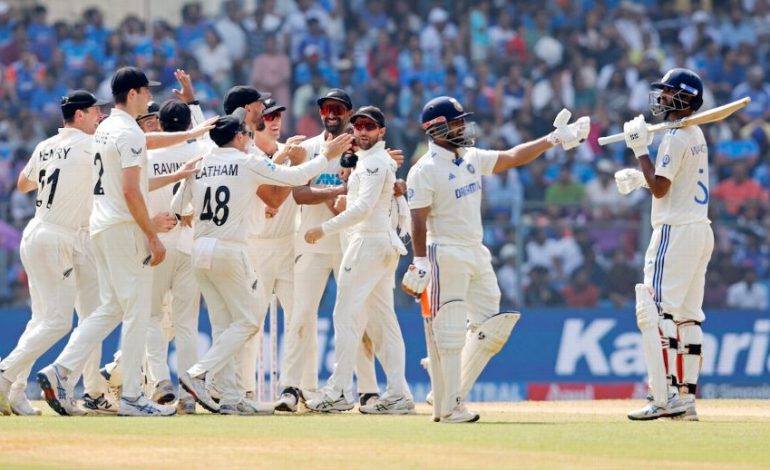
NZ do the unthinkable and hand India their first 3-0 whitewash
New Zealand Secures Historic Win Over India
In a thrilling conclusion to the series, New Zealand triumphed over India by 25 runs, marking a historic whitewash in a three-Test series on Indian soil. New Zealand’s second innings of 174 runs, highlighted by contributions from Tom Latham and Glenn Phillips, proved just enough to defend a target of 146 runs, despite a valiant effort from Rishabh Pant.
Pant’s explosive innings of 64 runs off 57 balls was instrumental in lifting India from a precarious position of 29 for 5 to 106 for 6. However, he was ultimately unable to lead his team to victory, as New Zealand’s bowlers, particularly Ajaz Patel and Phillips, combined for nine wickets. Ajaz had an extraordinary performance, finishing the match with an impressive 11-wicket haul, solidifying his status as the most successful visiting bowler at a single Indian venue.
India’s batting woes were compounded by a controversial Decision Review System (DRS) call that left them questioning the third umpire’s judgment. Pant was building momentum when he was involved in a crucial decision against Ajaz. After initially being given not out on a bat-pad catch, the third umpire, Paul Reiffel, overturned the decision, believing the sound detected by UltraEdge indicated a possible deflection off the bat. This moment shifted the momentum in favor of New Zealand.
Despite the contentious call, Ajaz’s performance cannot be overlooked. Having grown up in Mumbai and now representing New Zealand, he was coming off a less-than-stellar series prior to the final Test. However, he found his rhythm and took five wickets in the first innings, followed by three crucial early wickets in the second.
Ajaz’s dominance was evident as he consistently troubled the Indian batsmen. While he struggled against Pant—who scored 75 runs off just 41 balls against him—he effectively dismantled the rest of the batting lineup. During his spell, he took nine wickets for just 112 runs against the remaining Indian batters.
The unpredictable nature of the pitch added to the challenges for the Indian batsmen. Ajaz bowled with precision, exploiting the conditions to draw defensive strokes from the batters. Shubman Gill fell victim to a delivery he left alone, while Virat Kohli edged a defense to slip. Ravindra Jadeja, despite completing a remarkable 10-wicket haul in the match, was also undone by a turning ball that led to his dismissal.
The New Zealand bowlers, particularly Matt Henry and Glenn Phillips, kept up the pressure on India’s batting order. Rohit Sharma, eager to seize the moment, fell to Phillips after an aggressive start. Phillips, who had proven to be a valuable second spinner, took key wickets while maintaining tight control over his bowling.
Pant, however, was intent on turning the tide for India. His aggressive approach was evident as he quickly shifted into attack mode, striking a six over Ajaz’s head to mark his arrival. He consistently sought boundaries, running aggressively between wickets and challenging the New Zealand bowlers with inventive shots, including reverse sweeps that found gaps in the field.
Despite Pant’s heroics, New Zealand’s disciplined bowling and strategic field placements ultimately secured their historic victory. The series concluded with New Zealand making a remarkable statement by dominating the Indian team on their home turf, leaving a lasting impression on the cricketing world.






